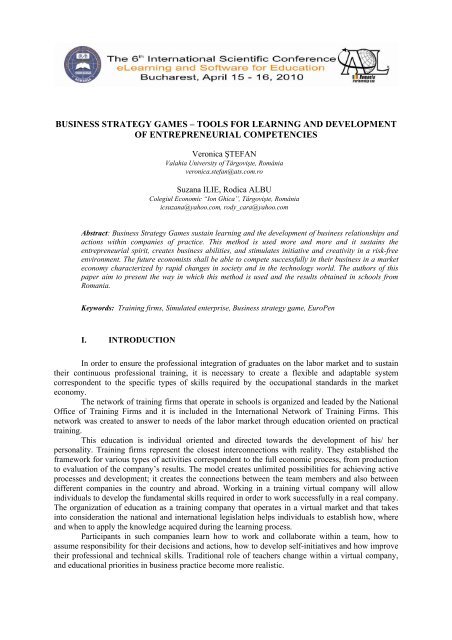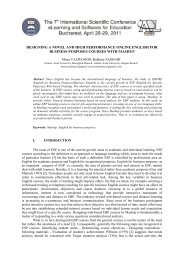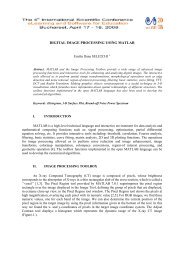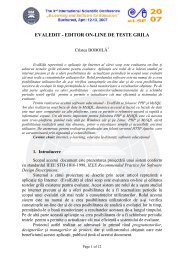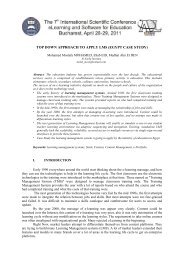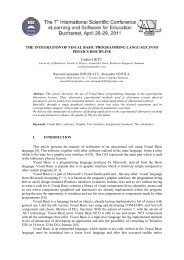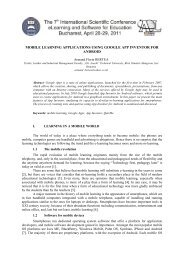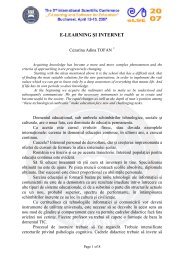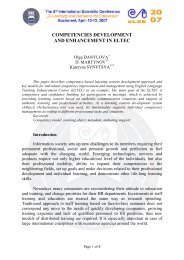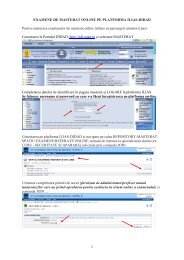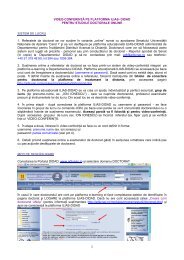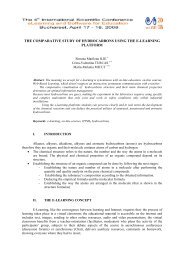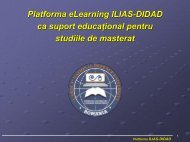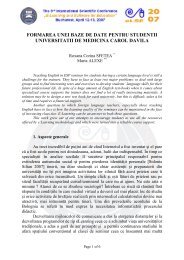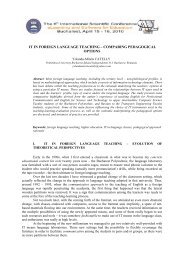tools for learning and development of entrepreneurial competencies
tools for learning and development of entrepreneurial competencies
tools for learning and development of entrepreneurial competencies
You also want an ePaper? Increase the reach of your titles
YUMPU automatically turns print PDFs into web optimized ePapers that Google loves.
BUSINESS STRATEGY GAMES – TOOLS FOR LEARNING AND DEVELOPMENT<br />
OF ENTREPRENEURIAL COMPETENCIES<br />
Veronica ŞTEFAN<br />
Valahia University <strong>of</strong> Târgovişte, România<br />
veronica.stefan@ats.com.ro<br />
Suzana ILIE, Rodica ALBU<br />
Colegiul Economic “Ion Ghica”, Târgovişte, România<br />
icsuzana@yahoo.com, rody_cara@yahoo.com<br />
Abstract: Business Strategy Games sustain <strong>learning</strong> <strong>and</strong> the <strong>development</strong> <strong>of</strong> business relationships <strong>and</strong><br />
actions within companies <strong>of</strong> practice. This method is used more <strong>and</strong> more <strong>and</strong> it sustains the<br />
<strong>entrepreneurial</strong> spirit, creates business abilities, <strong>and</strong> stimulates initiative <strong>and</strong> creativity in a risk-free<br />
environment. The future economists shall be able to compete successfully in their business in a market<br />
economy characterized by rapid changes in society <strong>and</strong> in the technology world. The authors <strong>of</strong> this<br />
paper aim to present the way in which this method is used <strong>and</strong> the results obtained in schools from<br />
Romania.<br />
Keywords: Training firms, Simulated enterprise, Business strategy game, EuroPen<br />
I. INTRODUCTION<br />
In order to ensure the pr<strong>of</strong>essional integration <strong>of</strong> graduates on the labor market <strong>and</strong> to sustain<br />
their continuous pr<strong>of</strong>essional training, it is necessary to create a flexible <strong>and</strong> adaptable system<br />
correspondent to the specific types <strong>of</strong> skills required by the occupational st<strong>and</strong>ards in the market<br />
economy.<br />
The network <strong>of</strong> training firms that operate in schools is organized <strong>and</strong> leaded by the National<br />
Office <strong>of</strong> Training Firms <strong>and</strong> it is included in the International Network <strong>of</strong> Training Firms. This<br />
network was created to answer to needs <strong>of</strong> the labor market through education oriented on practical<br />
training.<br />
This education is individual oriented <strong>and</strong> directed towards the <strong>development</strong> <strong>of</strong> his/ her<br />
personality. Training firms represent the closest interconnections with reality. They established the<br />
framework <strong>for</strong> various types <strong>of</strong> activities correspondent to the full economic process, from production<br />
to evaluation <strong>of</strong> the company’s results. The model creates unlimited possibilities <strong>for</strong> achieving active<br />
processes <strong>and</strong> <strong>development</strong>; it creates the connections between the team members <strong>and</strong> also between<br />
different companies in the country <strong>and</strong> abroad. Working in a training virtual company will allow<br />
individuals to develop the fundamental skills required in order to work successfully in a real company.<br />
The organization <strong>of</strong> education as a training company that operates in a virtual market <strong>and</strong> that takes<br />
into consideration the national <strong>and</strong> international legislation helps individuals to establish how, where<br />
<strong>and</strong> when to apply the knowledge acquired during the <strong>learning</strong> process.<br />
Participants in such companies learn how to work <strong>and</strong> collaborate within a team, how to<br />
assume responsibility <strong>for</strong> their decisions <strong>and</strong> actions, how to develop self-initiatives <strong>and</strong> how improve<br />
their pr<strong>of</strong>essional <strong>and</strong> technical skills. Traditional role <strong>of</strong> teachers change within a virtual company,<br />
<strong>and</strong> educational priorities in business practice become more realistic.
II.<br />
OPERATION FRAMEWORK FOR TRAINING FIRMS<br />
Training firm represent a teaching concept, based on practical <strong>learning</strong>. It constitutes a<br />
simulation <strong>of</strong> a real business <strong>and</strong> it is supported through the direct involvement <strong>of</strong> a coordinating<br />
teacher. A training firm is a simulated exercise, which reflects the real operations <strong>of</strong> a business within<br />
a domain <strong>of</strong> interest. It is a simulation <strong>of</strong> a real pr<strong>of</strong>essional situation with the purpose <strong>of</strong> achieving<br />
educational goals. Based on its open nature, the firm can interconnect with other similar training firms<br />
within the network <strong>and</strong> it is able to establish contracts with other market players <strong>and</strong> other simulated<br />
firms. The reason <strong>for</strong> the <strong>development</strong> <strong>of</strong> on open <strong>of</strong>fice within a training firm, without involving real<br />
production <strong>of</strong> goods, is to simulate real business processes <strong>and</strong> to cover all the basic business<br />
activities, without st<strong>and</strong>ing the risk <strong>of</strong> failure.<br />
When students become part <strong>of</strong> a training firm, they can observe <strong>and</strong> track all business<br />
processes, the relationship that emerges between them, <strong>and</strong> also the management <strong>of</strong> a company. The<br />
training firm operates in an <strong>of</strong>fice equipped with appropriate furniture, where students can access all<br />
the <strong>learning</strong> techniques that allow them to per<strong>for</strong>m economical <strong>and</strong> commercial operations based on<br />
the simulation <strong>of</strong> a real competitive environment. The main goal <strong>of</strong> this exercise is to allow students to<br />
activate in the simulation environment <strong>of</strong> a company in order to acquire key <strong>competencies</strong> that enable<br />
them to operate successfully in the real economic world.<br />
Figure 1. Key competences <strong>for</strong>med within a training firm<br />
After a practical training sequence with specialized teachers, the students will be able to:<br />
- Organize <strong>and</strong> lead the activity within the service companies;<br />
- Develop the <strong>of</strong>fer <strong>for</strong> the company’s products <strong>and</strong> services;<br />
- Tracking the company's accounting;<br />
- Per<strong>for</strong>m financial analysis <strong>and</strong> economic efficiency <strong>of</strong> the company.<br />
2.1 Main characteristics <strong>of</strong> training firms<br />
Moving towards a high level practical training in education contributes to the promotion <strong>and</strong><br />
the <strong>development</strong> <strong>of</strong> the students’ entrepreneurship <strong>and</strong> <strong>entrepreneurial</strong> competences, based on modern<br />
in<strong>for</strong>mation technology <strong>and</strong> the opportunity to use <strong>for</strong>eign languages. National <strong>and</strong> international<br />
students have business contacts, exercise their language skills <strong>and</strong> get to know the business cultures <strong>of</strong><br />
other countries.<br />
The relationships developed within a <strong>learning</strong> cycle among training firms can be maintained<br />
<strong>for</strong> future use <strong>and</strong> can be restored when a new session begins. The previous teams can introduce the
usiness contacts to the newcomers. This creates a solid operational context <strong>for</strong> simulation <strong>and</strong><br />
students integrate in a more complex environment that allows them to get closer to real life situations.<br />
The traditional role <strong>of</strong> the teacher, within practice firms, changes <strong>and</strong> the educational priorities become<br />
more obvious.<br />
The practical training can be based on three design models:<br />
- The <strong>learning</strong> <strong>of</strong>fice; simulation <strong>of</strong> economic activities based on a closed didactic<br />
model;<br />
- The practice firm, a model <strong>of</strong> simulation <strong>for</strong> the real economic process in a real<br />
company;<br />
- The junior firm, activates in the store, laboratory, consultancy <strong>of</strong>fice in the school.<br />
In order to carry out the processes required within a training firm, it is necessary to provide a<br />
laboratory with the economic, theoretical <strong>and</strong> practical conditions students need to activate. In this<br />
environment, the training firm:<br />
- Carries put its activity as a real company, but with virtual goods <strong>and</strong> money,<br />
according to the national legislation in <strong>for</strong>ce;<br />
- Implement knowledge on a real working place, under the methodological management<br />
<strong>of</strong> the teacher;<br />
- Carries out the connection between the educational <strong>and</strong> the pr<strong>of</strong>essional environment;<br />
- Provides the opportunity to involve experts from the practical area;<br />
- Eliminates important problems that would have appeared based on wrong decisionmaking,<br />
if operating in a real environment.<br />
- realizează legătura între şcoală şi mediul pr<strong>of</strong>esional;<br />
2.2 Educational purpose <strong>and</strong> tasks <strong>of</strong> training firms<br />
The teachers play a crucial role in preparing the Company or throughout the exercise. They<br />
must have skills <strong>and</strong> knowledge <strong>of</strong> commerce <strong>and</strong> management. Diverse training firms are consultants<br />
<strong>and</strong> organizers <strong>of</strong> the training process <strong>and</strong> must master the principle <strong>of</strong> the practice-oriented training.<br />
They <strong>of</strong>fer consultations <strong>and</strong> foster independence in training firms, verify the knowledge <strong>and</strong> skills<br />
acquired by students, motivate, activate <strong>and</strong> guide the work <strong>of</strong> students.<br />
The teachers sustain students to assume responsibilities, to make decisions, to participate<br />
within the team, to think critically, to solve unexpected problems that might occur. The teachers act<br />
both like active moderators <strong>and</strong> co-participants. They will encourage self-management, initiative <strong>and</strong><br />
students’ self-evaluation, <strong>and</strong> boost work team. They will be both consultants <strong>and</strong> instructors, acting<br />
towards the immediate improvement <strong>of</strong> work <strong>and</strong> solving conflict situations.<br />
Working in a training firm brings new opportunities <strong>and</strong> challenges <strong>for</strong> teachers as well:<br />
- Teamwork requires qualities such as responsibility, organizational skills, exactness,<br />
precision, accuracy, conflict-solving skills.<br />
- Training firms involve knowledge from various domains <strong>of</strong> activity, such as<br />
accounting, law, in<strong>for</strong>mation technology, or social science, <strong>and</strong> this is a dem<strong>and</strong>ing<br />
work that implies the teacher must have extra knowledge in these fields.<br />
- Training firms study <strong>and</strong> apply the norms .established <strong>for</strong> its activity (laws,<br />
government decisions, emergency government decisions <strong>and</strong> so on); the teacher must<br />
constantly update his/ her knowledge.<br />
- By simulating real situations, the students become aware <strong>of</strong> the specific objectives <strong>of</strong><br />
enterprises, <strong>and</strong> they underst<strong>and</strong> its organization structure. This requires that the<br />
teacher maintains a close relationship with the real enterprise correspondent to the<br />
virtual one.<br />
- The role the teacher is different. S/he supports the activity, coordinates <strong>and</strong> controls it.<br />
This makes his/ her work more complex <strong>and</strong> difficult, but also more interesting.<br />
The training firms implies the use <strong>of</strong> diverse methodologies, <strong>of</strong> simulation, individual <strong>and</strong><br />
team work, imaginary discussions, presentations <strong>and</strong> case studies. The experience <strong>of</strong> students <strong>and</strong><br />
teachers within the firm <strong>of</strong> exercise resulted in numerous awards received by the Economic College<br />
"Ion Ghica" Târgovişte at international expositions concerning training firms.
III.<br />
IMPLEMENTATION OF THE TRAINING FIRMS’ METHOD<br />
In terms <strong>of</strong> contemporary economic <strong>development</strong>, marked by trends <strong>of</strong> globalization <strong>and</strong><br />
market economy, the social partners cannot have just the role <strong>of</strong> observers; they need to participate<br />
effectively in the decision-making process <strong>and</strong> its implementation, so that business can achieve their<br />
planned objectives. Social partnership in vocational training is linked to the idea <strong>of</strong> association <strong>and</strong><br />
that <strong>of</strong> joint, collective action.<br />
The concept <strong>of</strong> association is, in turn, traditionally linked with concepts <strong>of</strong> participation,<br />
collaboration <strong>and</strong> cooperation. The partnership is not just a new social structure, but it represents a<br />
new philosophy <strong>of</strong> <strong>development</strong> <strong>of</strong> social relations. There<strong>for</strong>e, it is important to identify those partners<br />
who really have to say something, which can optimize the decision in a particular social process<br />
through their input <strong>and</strong> support.<br />
Figure 2. Sites promoting training firms<br />
School-business partnership that aims to sustain work-based <strong>learning</strong> takes on a new<br />
dimension in terms <strong>of</strong> carrying out practical training <strong>of</strong> students as a <strong>learning</strong> method. Although there<br />
is no real transfer <strong>of</strong> property or money, <strong>and</strong> no other types <strong>of</strong> transactions held, orders <strong>and</strong> invoices<br />
are issued, <strong>and</strong> financial records are maintained - including records <strong>of</strong> creditors, the debtor,<br />
transactions <strong>and</strong> stocks, <strong>and</strong> so on.<br />
A business practice is very <strong>of</strong>ten assisted by at least a real company - the so-called Mentor<br />
Company - whose products <strong>and</strong> services are in the same range <strong>and</strong> category <strong>of</strong> business practice.<br />
Mentor Company provides in<strong>for</strong>mation on technical <strong>and</strong> management problems. Practice companies<br />
undertake market research, business advertising, acquisition <strong>of</strong> raw materials, transport operations,<br />
management <strong>of</strong> inventories, <strong>development</strong> <strong>of</strong> plans <strong>and</strong> strategies on short <strong>and</strong> medium term,<br />
production <strong>of</strong> goods on simulated markets, payment <strong>of</strong> salaries, fees, etc. <strong>and</strong> submission <strong>of</strong> statistical<br />
reports.<br />
In addition to these objectives, there are also other targets to be achieved such as the ability to<br />
take initiative, increase confidence <strong>and</strong> obtain the necessary knowledge to establish work teams,<br />
sharing tasks <strong>and</strong> choice management within companies. Participants in the company learn how to<br />
activate within the teams, take responsibility, develop self-initiative <strong>and</strong> improve their pr<strong>of</strong>essional<br />
<strong>and</strong> technical skills.<br />
Prior to the establishment <strong>and</strong> registration, training firms identify businesses that have the<br />
same object <strong>of</strong> activity <strong>and</strong> choose a firm as Mentor. This company agrees <strong>and</strong> gets involved in<br />
creating partnership with the company <strong>of</strong>fice, materialized by a partnership agreement covering<br />
mutual benefits.
Differentiation<br />
criteria<br />
Accomplishments<br />
Training firm<br />
Decision-making is similar to<br />
real life circumstance, but the<br />
goods <strong>and</strong> services are virtual.<br />
Real firm<br />
The entire spectrum <strong>of</strong><br />
possible tasks. Real<br />
goods <strong>and</strong> services.<br />
Cash flows There is no real cash flow. Real cash flow<br />
Company Risk The company does not<br />
undertake any risks,<br />
The risks must be<br />
undertaken.<br />
External contacts<br />
Table 1. Differences between training firms <strong>and</strong> real companies<br />
In training firms students behave as responsible managers or employees <strong>and</strong> educate their<br />
<strong>entrepreneurial</strong> spirit. They exercise real economic transactions within a company, as the training firm<br />
is structured in correspondence with the real situations. The departments are similar: human resources,<br />
secretarial, marketing, sales, finance, accounting, <strong>and</strong> the firm’s activity is conducted as required by<br />
law that applies to the Mentor Company. It is registered at the Central Office ROCT Timisoara <strong>and</strong><br />
uses the same documents as the Mentor Company, having a distinctive mark TEACHERS USE /<br />
WORK FORM.<br />
Business activity <strong>of</strong> the exercise firm is characterized by two defining aspects:<br />
- Virtual: there are no real money <strong>and</strong> no real goods;<br />
- Real: the commercial legislation is observed, there is an in<strong>for</strong>mational flow, there are<br />
documents similar to those used by Mentor Company.<br />
Simulated situations <strong>and</strong> the failure to succeed constitute relevant, vital <strong>and</strong> necessary<br />
experiences <strong>for</strong> students. Wrong decisions, which <strong>for</strong> the Mentor Company could lead to endangering<br />
its existence, do not attract negative economic consequences because students operate in a virtual<br />
situation. Skills training is achieved through practice situations in the Mentor Company, <strong>and</strong> the<br />
exercises are multiple in structure <strong>and</strong> texture.<br />
Acquiring key skills (ability to work in teams, interdisciplinary thinking, communication<br />
skills, <strong>and</strong> ability to make decisions) allows students to obtain pr<strong>of</strong>essional skills <strong>and</strong> labor market<br />
flexibility <strong>and</strong> high affinity towards finding a work place. These skills can reduce the period <strong>of</strong><br />
accommodation at real work environments <strong>and</strong> can bring great benefit <strong>for</strong> future employees <strong>and</strong><br />
employers.<br />
The power <strong>of</strong> the exercise firm lies in the networking determined by the conduct <strong>of</strong> market<br />
trading on behalf <strong>of</strong> training firms (national <strong>and</strong> international) <strong>and</strong> in communication with the external<br />
environment <strong>of</strong> the firm <strong>of</strong> exercise, namely: collaboration with the Mentor, with other operators, with<br />
state institutions etc. The relationship with the Mentor Company does not materialize only through<br />
sponsorship, but also through actual practical training conducted by business students in the<br />
departments <strong>of</strong> this company. On this occasion, students are faced with real situations.<br />
To successfully implement this new concept <strong>of</strong> teaching in school <strong>and</strong> achieve per<strong>for</strong>mance,<br />
the Mentor Company should provide financial <strong>and</strong> logistic support concerning:<br />
- Documentation <strong>and</strong> materials;<br />
- Provide access to specific hardware equipment <strong>and</strong> s<strong>of</strong>tware applications;<br />
- Legislation in <strong>for</strong>ce;<br />
- Real accounting records;<br />
- Provide the environment <strong>for</strong> repetitive actions;<br />
- Sponsor the participation <strong>of</strong> the practice firm at dedicated national <strong>and</strong> international<br />
expositions.<br />
These ef<strong>for</strong>ts are compensated through the advertising <strong>of</strong> the Mentor Company at local level, as an<br />
example <strong>of</strong> good practices that sustain the correlation between the labor market <strong>and</strong> key <strong>competencies</strong>.
IV.<br />
EUROPEN NETWORK<br />
The global network <strong>of</strong> practice firms consists <strong>of</strong> more than 42 countries <strong>and</strong> thous<strong>and</strong>s <strong>of</strong> such<br />
firms. The international network <strong>of</strong> practice firms is called Europen (used in Europe) <strong>and</strong> International<br />
PEN (used outside Europe).<br />
Since 1997, all national networks <strong>of</strong> business practice firms were linked through international<br />
EUROPEN / Pen international network that facilitates business transactions between firms in practice<br />
worldwide. International Network also promotes further <strong>development</strong> <strong>of</strong> the concept <strong>of</strong> globally<br />
business practice <strong>and</strong> creates a variety <strong>of</strong> training <strong>tools</strong>. Traditional trade with companies is an<br />
essential component <strong>of</strong> this concept, marketing firms practice interacting in a closed economy under<br />
specific <strong>and</strong> strict commercial principles.<br />
Figure 3. The Web page <strong>of</strong> EUROPEN network<br />
Advantages <strong>of</strong> deploying educational activities in practice firm:<br />
- The activity is organized by teams;<br />
- The work process is more important that the final result <strong>of</strong> the economic process <strong>and</strong><br />
<strong>for</strong> this reason the bad results or incorrect decision are valuable <strong>for</strong> the student’s<br />
experience; all the situations can have more simulated solutions <strong>and</strong> from the<br />
didactical point <strong>of</strong> view a virtual company or practice firm with more problems are<br />
better <strong>for</strong> <strong>learning</strong> <strong>and</strong> underst<strong>and</strong>ing real-life situations;<br />
- The <strong>learning</strong> process is more structured;<br />
- The students have to take a greater responsibility;<br />
- In the practice firm, participation <strong>of</strong> each member must to be comparable <strong>and</strong> the<br />
volume <strong>of</strong> work must to be the same.<br />
4.1 Business Strategy Games<br />
Business Strategy Games or game simulation is the most widely distributed <strong>and</strong> used<br />
computer game <strong>for</strong> the strategic management market <strong>and</strong> it is used in all business schools worldwide.<br />
An example <strong>of</strong> simulation using this product the authors present the sports shoe industry, which covers<br />
a significant geographic area <strong>and</strong> a market with a global character. Each company in the industry<br />
network is managed by a team <strong>of</strong> student-players that compete against other teams.
Participation in a simulated company also calls <strong>for</strong> most varied decisions. The company<br />
manages factories <strong>and</strong> players must do their work, commit work<strong>for</strong>ce <strong>and</strong> ensure wages, monitor<br />
expenditure distribution <strong>and</strong> stock control, decide on capital expenditure, leading marketing <strong>and</strong> sales<br />
campaigns, have a proper site <strong>and</strong> present their company, make projections on sales revenue, taking<br />
into account exchange rate fluctuations, interest rates <strong>and</strong> stock market <strong>development</strong>s.<br />
Strategic options that companies are adopting have the most varied extensive <strong>and</strong> intensive<br />
nature. Depending on the end result, given the high or low pr<strong>of</strong>its, they may choose to change prices,<br />
higher quality services, choose a serial or limited production line, opt <strong>for</strong> an extensive network <strong>of</strong> sales<br />
or reduce costs on advertising. The market shares <strong>of</strong> each company are based on how it has considered<br />
each attribute <strong>of</strong> the product <strong>and</strong> the volume <strong>of</strong> competitive ef<strong>for</strong>t in the company's ef<strong>for</strong>ts comparing<br />
to competing firms. Dem<strong>and</strong> conditions, prices <strong>and</strong> wage rates vary from one geographical area to<br />
another. All these issues are likely to create a stimulating environment <strong>for</strong> action <strong>and</strong> decision in a<br />
virtual business environment, as close to the actual real market action.<br />
Figure 4. Business strategy game Web page<br />
4.2 Using modern technologies in the training firms’ activity<br />
In<strong>for</strong>mation <strong>and</strong> communication technologies (ICT) caused changes in all fields <strong>of</strong> society,<br />
including the educational process. Applications <strong>of</strong> ICT can’t be excluded from the activity <strong>of</strong> training<br />
firms. Since the creation or acquisition <strong>of</strong> a company, participants access the Web page at ROCT<br />
(Romanian Office <strong>for</strong> Training Companies) http://www.roct.ro/ to download in<strong>for</strong>mation, procedures,<br />
registration <strong>for</strong>m requested to continue the company's activities, other legal process, virtual<br />
settlements, organizing events <strong>and</strong> communicate with the Training Firms‘ Center. For networking with<br />
other training firms from Romania or abroad, participants use electronic communication.<br />
Applications <strong>and</strong> multimedia presentations can be a valuable marketing tool. To this aim,<br />
students use:<br />
• Multimedia applications to create presentations: PowerPoint, IrfanView;<br />
• Web technologies to create dynamic Web pages;<br />
• Applications to create catalogs <strong>of</strong> products, promotional brochures, advertising flyers,<br />
billboards: Micros<strong>of</strong>t Office Word, Publisher, Adobe Photoshop.<br />
To create a virtual store they use specialized s<strong>of</strong>tware like Fshop4, Eshop-Fast, Web<br />
technologies like HTML, PHP <strong>and</strong> dedicated applications such as Micros<strong>of</strong>t FrontPage.
Another category <strong>of</strong> s<strong>of</strong>tware used by companies consists <strong>of</strong> economic <strong>and</strong> management<br />
applications to automate business management, human resource <strong>and</strong> necessary reports to evaluate the<br />
company. For this scope they use st<strong>and</strong>ard solutions or generalized s<strong>of</strong>tware packages such as CIEL,<br />
<strong>for</strong> the management <strong>of</strong> all company departments: financial- accounting, payroll, business management<br />
(billing, ordering, inventory <strong>and</strong> statistics), fixed assets/ property, cash flow, bank records <strong>and</strong><br />
contracts, customers <strong>and</strong> suppliers a.s.o.<br />
V. Conclusions<br />
Using the training firms’ method in the educational process <strong>of</strong> <strong>learning</strong> grows significantly the<br />
interaction between school <strong>and</strong> the industry, beneficial in both directions <strong>and</strong> simulates the chance to<br />
apply <strong>and</strong> practice in real life circumstances. Through this exercise <strong>of</strong> imagination <strong>and</strong> action,<br />
businesses <strong>and</strong> schools are in a process <strong>of</strong> symbiosis. Students working in those virtual companies are<br />
responsible <strong>for</strong> themselves <strong>and</strong> their team’s actions, learn to interact with business partners, can h<strong>and</strong>le<br />
various leadership positions that will create a hierarchy among colleagues <strong>and</strong> can accumulate the<br />
experience <strong>of</strong> success <strong>and</strong> also failures <strong>for</strong> future commercial activity. For this reason, many<br />
companies rely on such graduates <strong>of</strong> training firms in their recruitment activities. Moreover, many<br />
companies provide practical support to companies, providing expertise <strong>and</strong> mentoring in the<br />
partnership agreements. These graduates can start working immediately after graduation <strong>and</strong> quickly<br />
integrate on the labour market.<br />
Continuity <strong>of</strong> work in practice firms support entrepreneurship <strong>and</strong> encourage the initiative <strong>of</strong><br />
private business start-ups, while reducing business risk. An entrepreneur educated, innovative <strong>and</strong><br />
creative will be able to operate <strong>and</strong> compete successfully with his business in a market economy<br />
characterized by very rapid changes brought by technological <strong>and</strong> social changed environment.<br />
References<br />
[1] G. Boe, C.Cacaliceanu, G. Ciobanu, F. Kemenski, F. Mitrache, C. Rabontu, „Din şcoală în viaţă prin firma de<br />
exerciţiu”, Editura Didactică şi Pedagogică, RA, Bucureşti, 2005<br />
[2] S. C. Ilie, „Impactul creşterii protecţiei consumatorilor şi a mediului asupra restructurării sortimentului şi<br />
îmbunătăţirii calităţii produselor” - Teză de doctorat - 2005<br />
[3] V. Stefan, C.Fratila, “Knowledge Transfer in Economic Sciences Through Simulation” , microCAD International<br />
Conference Miskolc, Hungary, 2008 Mars, Conference Proceedings pp. 213-218, ISBN 978-963-661-826-1,<br />
www.uni-miskolc.hu/~microcad/program/q2.htm<br />
[4] V. Stefan, “S<strong>of</strong>tware <strong>for</strong> virtual environment in economic sciences”, Alba Iulia University, 2007, Annales<br />
Universitatis Apulensis, Oeconomica Series, Volume II pp. 481- 488, ISSN 1454-9409<br />
[5] *** Helping to create an <strong>entrepreneurial</strong> culture - EC publication at<br />
http://community.flexible<strong>learning</strong>.net.au/TeachingTrainingLearners/content/article_6081.htm<br />
[6] *** The Practice Firm Prepares Participants <strong>for</strong> the Real World, Europen Bulletin No. 26nd at<br />
http://cms.europen.info/index.phpid=79<br />
[7] http://www.roct.ro<br />
[8] http://cms.europen.info/<br />
[9] http://www.ibc.com.au/1/3/1/solutions_<strong>for</strong>_b.pm<br />
[10] http://www.rcee-cpfn.ca/<br />
[11] http://www.bsg-online.com/<br />
[12] http://www.act.at/DE/default.asp<br />
[13] http://en.wikipedia.org/wiki/CIMOSA


